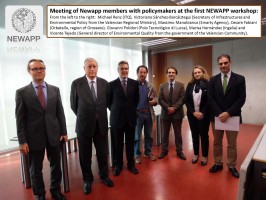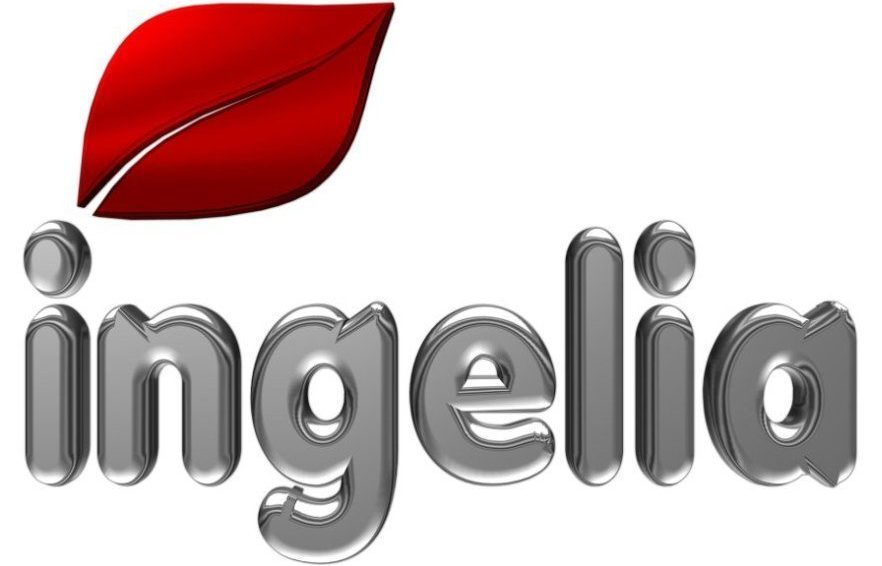 On November 13th was held the first workshop of the European project Newapp. The conference was opened at 9:30 by the Regional Secretary for the Environment of the Valencian Government, Victoriano Sánchez-Barcáiztegui, who stressed the commitment of the Valencian Government on new technologies in the treatment of waste in order to achieve the Environmental goals of the European Union.
On November 13th was held the first workshop of the European project Newapp. The conference was opened at 9:30 by the Regional Secretary for the Environment of the Valencian Government, Victoriano Sánchez-Barcáiztegui, who stressed the commitment of the Valencian Government on new technologies in the treatment of waste in order to achieve the Environmental goals of the European Union.
The conference started with an exhibition of the General Manager of Environmental Quality of the Valencian Government, Mr. Vicente Tejedo Tormo, who explain the Integrated Waste Management Plan, and in particular, on the possible applications of new technologies to the organic fraction of municipal waste. The General Manager highlighted the interest of the Government to implement new technologies for the treatment of organic waste if they permit to lower their management and waste recovery costs and are beneficial to the environment.
Then, the Institute of Chemical Technology (ITQ), gave a description of Newapp project, its objectives and the different stages of the work. The project Newapp aims valuing moist organic matter that usually are not profitable due to the high energy cost on drying them in order to obtain similar high value carbon products. Specifically, within the research project Newapp are pursued in various types of organic matter such as organic fraction of waste, sewage sludge, kitchen scraps and food industry.
HTC technology allows dehydration of organic matter with high moisture levels with an optimal energy balance, therefore, allows the recovery of a wide range of biomass that nowadays have no possibility of recovery. Ingelia has developed and patented an industrial design that applies the HTC technology. Ingelia’s design is modular, formed of reactors processing 3000 tn/year dry basis, allowing the plants to be sized depending on the amount of raw material and reducing the logistics costs and the risk of scaling, while allowing continuous operation of the plant even if a line stops. Furthermore Ingelia’s design minimizes CAPEX and OPEX due to not having moving parts or heat exchangers.
Also was exhibited a decentralized biorefinery model achieved by applying the HTC technology for recovery of different types of wet biomass in an area. Recovery of all organic waste generated and obtaining three products are achieved: biocoal, fertilized water and essential oils. Biocoal, initially for the power sector to produce heat, also has properties as a raw material in industry, fuel cell basis or as substrates for soil regeneration. The liquid phase of the process, from the moisture contained in the biomass, contains the inorganic components that plants use at the time to grow, such as N, K, etc. which are returned to the fields and plantations, thus reducing their need for chemical fertilizers. Essential oils, which are also being investigated by the ITQ through a INNPACTO program funded by the Economy Ministry, are biochemical products who have applications in the pharmaceutical and fragrance industry. So, a sustainable cycle who take advantage of sunlight is achieved. Plants by performing photosynthesis get absorbing CO2 from the Atmostphere, and soil nutrients, incorporate carbon and emit oxygen. With HTC carbon from biomass is concentrated and these nutrients are returned to the soil.
In turn, Smarty Agency described the waste management sector in Italy showing that in Italy new facilities are neede for treatment of organic waste, and made a comparison between the hydrothermal carbonization application and other technologies for valuing organic waste such as composting or biomethanation. The HTC technology requires less space and lasts much shorter process, obtaining a higher concentration of carbon, so that the energy efficiency of the process in terms of biochar recovered energy is 360% higher. Besides HTC biocoal has several marketing channels compared to the single track that have compost or biogas. Considering only the use of HTC biocoal as compost, it is observed that the concentration of nutrients and carbon, reduces logistics costs of transport and storage, allowing a value per tonne ten times higher. At the conclusion of the exhibition showed that hydrothermal carbonization is an easy and attractive technology which allows generation of products at a significant lower cost than with other petrochemical processes whose characteristics often exceed the “Golden Standards”.
The day ended with the presentation of CPL Industries. CPL is Europe’s leading distributor of solid fuels, with 65% market share, and has developed and patented the product “ecoal 50”, who consists of 50% coal and 50% biomass, betting on biocal HTC as the next step in the development of renewable solid fuels. Additionaly, biocoal HTC is comparatively similar to other solid fuels in the domestic sector and has more energy density than other biomass fuels. The possibility of making biocoal facilities near to consumer representa an advantage by decreasing transport costs involved. Additionally, the fact that Ireland and France CO2 emissions taxes are high and are even forecasted to increase, make the commitment with biocoal HTC strategic in order to avoid paying this fee. The UK government also encourages the use of renewable heat, being ncreased by 812 MW the combustion biomass installations. An increase in consumption of biofuels is expected around 240,000 tonnes, of which half will wood pellets. In the UK, the rates of recovery of organic waste, are between 35 and 60 €/tn, making the economic parameters of HTC still more attractive than other competing technologies like torrefaction who needs low moisture and have a processing costs about 100€/tn. Therefore CPL sees strategic HTC biocoal in order to fill the gap on European market generated by rates of CO2. As partner of Ingelia, provides a purchase agreement of biocoal to any HTC plant tendered with Ingelia’s technology. In conclusion, CPL seeks three-party agreements between Ingelia, bringing his experience with technology, waste managers, making more sustainable management of waste, and CPL providing an avenue for marketing biocoal through own distribution agreements with leading European distributors.

 Castellano
Castellano English
English